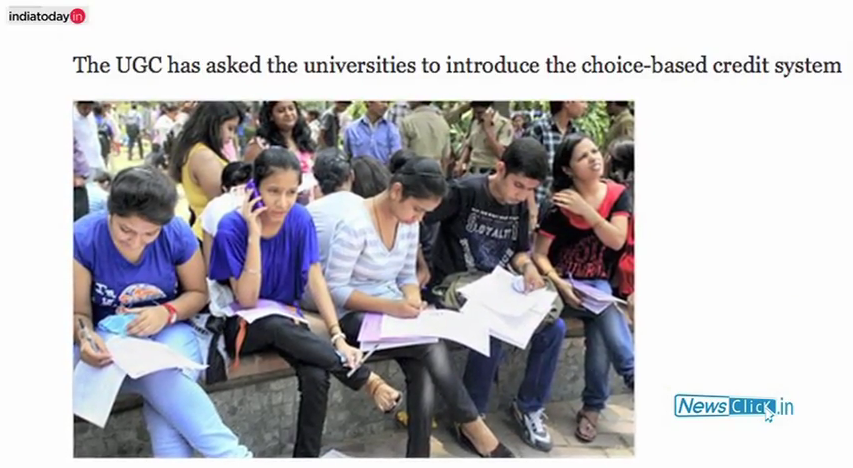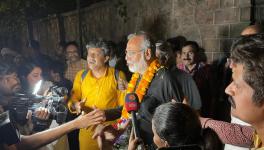UGC Builds Another Castle in Air: Choice based Credit System (CBCS)
For past 4-5 years undemocratically imposed reforms like introduction of semester system and FYUP (Four Years Undergraduate Programme) have led to huge losses for students in Delhi University. Recently UGC proposed Central Universities Act and implementation of CBCS (Choice Based Credit System) which led to huge protests and opposition.
Newsclick interviewed Prof. Abha Dev Habib, Executive Council Member of Delhi University to discuss the ongoing issue. Abha points out various strong reasons for opposing CBCS saying that the “cafeteria” approach is to mould the purpose of education for market requirements rather than educating students. She thinks that these changes in the name of “reforms” will kill the autonomy and areas of strength in teaching and research of Central Universities like DU and JNU. Abha also talks about how the basic and most important issues of infrastructure, appointment of professors and availability of books in libraries are being ignored completely harming the quality of education.

Pranjal: Hello and welcome to Newsclick. Today, we are going to discuss about various reforms that have been imposed by Delhi University since last four fiver years. The recent one being choised based credit system. To discuss about this issue, we have with us Abha Dev Habib who is an executive council member of Delhi University. Hello Abha. We have recently seen in the newspapers, thirty teachers union of various colleges along with the teachers association of Delhi University has passed a resolution against choice based credit system. So what is this choice based credit system, why have these teachers union decided to oppose it?
Abha: November onwards we started getting circulars from UGC and MHRDs saying that all central universities should implement choice based credit system from the academic session 2015-16 and in February they have uploaded a document, proposal on choice based credit system which said that we want choice based credit system, which will use semester system which will have cafetaria approach and which will use credit transfer between various institutions MoUs should be signed, there should be a credit transfer and student can build their degrees and they wanted a uniform grading system. Subsequently, on 10th April, they have uploaded a structure of choice based credit system and they have given a syllabic of 19 courses, they have asked the universities to respond within fifteen days. So our opposition is on following counts one is that it is not for the UGC to dictate terms in this manner to make a structure and a syllabic for the universities.. it is for the Universities to draft their own course curriculum and syllabic. The UGC can maintain standards and there are provisions to maintain standards but it can not convert universities into a factory outlets of a company. This is like taking away academic autonomy of the universities and we can not stand this kind of dilution of the universities. This also means that now onwards there will be no contribution of the teachers in policy making. The second thing is that if they implement a uniform course curriculum the basically what is happening is they are not taking into account diverse nature of universities, the diverse population they cater to and a uniform curriculum will not benefit students of various states and all because readings of a subject and all should vary and will vary from region to region and this should be honoured by the UGC. The third important thing is that they are making an assumption that a semester system is working well whereas many many feedbacks are now there in the public domain. Delhi University students teachers have always said that the semester system is not working well, we are 1.5 lakh students in regular courses. With semesterisation of under-graduate courses we are spending more time in examination rather than teaching, learning process. It has also taken away opportunities from students to do in-depth study or self study and the subsequent reforms only diluted the academic standards. This is also been experience of say Kerala Universities, it has also been experience of Madhya Pradesh Universities and all these documents are in the public domain. Therefore, we think, we demand that before UGC moves ahead and brings a structure which uses semester system it should first review semester system and also review choice based credit system wherever it was implemented. The another thing is this whole thing of cafeteria approach, on paper it looks very good however, the reality is that because there is a cap on infrastructure in terms of both classroom, labs and teachers. The number of choices which a university can really offer, a college can really offer are limited and when they offer or honour students choices, first choices as was done in DC 2 of FYUP, we saw that it couples the choices to the market. The market starts determining the choice student will make and therefore, what happens that the basic fundamental sciences, humanity courses take a beating and a few students who want to do these courses are then denied the opportunity because once again there is a limited number of rooms available and limited number of teachers to a particular college. The third thing is credit transfer and we see that in credit transfer basically the government wants the public funded universities to start signing MoUs with other institutions and here I will want to say that both central universities act 2009 as well as central universities bill 2013 which the current government is also pushing say that you sign MoUs with the universities. They do not limit to public funded universities. So while we want to know what happened to the reservations, we want to understand the fee structure and this will only create an opinion a disparity among educational qualification from which people can earn and it will real depend on how much money they can spend. Also, both cafeteria approach and credit transfer will mean the workload of teachers will keep fluctuating and we already see that in universities more than 40 percent, 50 percent are ad-hoc teachers universities will stop drawing talent if teachers are there to remain ad-hoc for many many years. Even the UGC says, there are three great disadvantages in implementing these schemes. One is that if we go to the grading system then to convert it completely to marks is not possible. One particular digit you want that you will not get. The second is the workload of teachers will fluctuate and the third thing is the infrastructure is not ready. So if the infrastructure is not ready and if this can not be quality changed it should not be rushed.
Pranjal: You have been talking about how UGC has been talking about sending the feedbacks. When we talk specifically about the case of Delhi University there is no proper structure visible on Delhi University website or which has been issued by Delhi University which tells about how this entire course will be, the choice based credit system will be. But they have again and again been saying they will lead to better mobility chances for migrate to good colleges. So what do you have to say about it.
Abha: Yeah, very important question Pranjal the first thing is if you are saying that this has to be implemented in 2015-16 this actually means that the UGC and MHRD is not giving universities enough time to hold their consultative processes through statutory bodies, apply their mind, collect feedback and in Delhi University, we have also seen that this only meant that after November notification the Vice-Chancellor has set an eight member committee in the month of December and he brought this as a reporting item in the academic council whereas the academic council can discuss whether we are ready for such a reform? What does this reform really mean for us? No such discussion was ever held and not been held till today and today the UGC has given only fifteen days which again means no consultative process in any of the universities can be held. So in some way, you are forcing the universities to betray their own acts and ordinances and bring about a reform. The next thing which you have asked is about mobility and there is much Hungama which is made of this mobility. I want to ask this question that can Kalindi college student come to Miranda House Physics department, the answer is yes provided we have a seat. So seat is very important because there is a gap we gets the number of students, the infrastructure, the money we can get is per student. If the seats are if you know do not expand, if the seats are constant and then they are full, then we can not take any new student and similarly Motilal Nehru College student can go to KM college, the answer is same provided they have requisite marks and they have seats. The answer is that colleges are overburdened right now, over admission takes place and anyway after the OBC expansion the infrastructure development which should have been there is not place even today and we are panting for space and time. The next thing is can Allahabad student come to Delhi University? The answer is yes, they can. The equivalence will be set, they will be told to do some extra courses, some papers and they can take admission but again provided that we have seats. So when they are talking about mobility, therefore, we come to a conclusion that they are not looking at this kind of mobility. What they are really looking at is whether we can sign MoUs with private players both domestic and foreign and can our students from one semester for a paper or two papers go there. This is basically the concept of meta-college, meta-university which was also floated by Kapil Sibal following higher education submits in America with Hillary Clinton. So this is not a new concept and in fact, in Delhi University, there are two courses which are being run on this scheme. One is B-Tech Humanities which was subsequently because of UGCs intervention named as BA Honours in humanities and social sciences and we have M.Tech in Mathematical innovations. So the M.Tech course is being run by cluster innovation centre in DU, the CI education department in DU and Jamia Milia. Now, this is a collaboration between public funded universities therefore, we can deal with reservations and fee structure as we expect. But I do not understand what will happen if we start signing MoUs with private players and the ask our students to move for a semester or two semester there. Also, the students strength in these courses is very small and may be it is doable. If we look at large scale implementation of the same scheme, I do not think it can work out well because once again you have time table constrains, so on and so forth.
Pranjal: You have been talking about reservation in fee structure. We have seen OBC expansion in Delhi University itself. Recently, in the last year government has issued a paper in the name of the Dinesh Singh that he has diverted those funds for alluring people and be part of FYUP so that they can show that it is a good project that we have brought in. The question of basic infrastructure, equal standard for all the people, people have not getting books in various languages itself in Delhi University. So don't you think these question are getting left behind but we are just focusing on run behind market oriented course structure, market oriented subjects.
Abha: Yes, in fact, I wanted to say there are three basic questions in front of higher education or in front of education and that is quality, of equity and massification. We want to reach out to as many people as we want and it is unfortunate to see that the UGC document is completely silent on how they think that choice based credit system can enhance quality or it will cater to equity or massification. And you know if you ask me in the last seven eight years the best reform that really happened to the universities was OBC expansion where we expanded Universities after several years and both in terms of student in take and the teacher in take the number has to go upto 1.5 times. But today what we see is that instead of catering and making this reform really a workable reform, what has happened is that the UGC, the university administration has not paid any interest and forced colleges to develop infrastructure. There are problems because the MCD is not giving approval or the colleges do not have space and as a result, the infrastructure expansion which would have happened has not happened and this is also true that the RTI responses showed that the Vice-Chancellor had diverted approximately 170 crore money, fund which was meant for OBC expansion for infrastructure development, for hiring teachers and all to buying laptops and FYUP.
Pranjal: Delhi University has also again been in various news for Vice-Chancellors autocratic approach. We have seen the students movement, the teachers movement losing the space, the space for democracy is shrinking. Do you think these courses will lead to more intensified efforts on the part of the University authorities and part of the state to curb these voices of dissent.
Abha: Actually, I see a direct correlation between this curbing dissent, this tendency to govern this university in this particular manner and the 'reform', the restructuring. I don't consider them as 'reforms' but the restructuring which the government and the Vice-Chancellor therefore, want to implement and I see that after they floated the idea of semisterisation and colleges were asked to send feed back and when they sent frank feedback, then feedback was put in a dustbin and after that DUTA has been target of Vice-Chancellors mis-governance curbing democratic spaces, this assault on democratic spaces and targeting dissenters this became a trend in the university because they did not want teachers to build opinion and take that opinion to the public domain against the reforms and we saw that this whole tendency increased during FYUP struggled and even now I think and once again when the UGC will force any such reform. It can come only you will target dissenting voices because otherwise the teachers going to and will and my hope lies in the fact that even when there was an onslaught on democratic spaces, the teacher movement and the student movement will continue to demand that the education system should be such that it deliver and what it and the promises have been made to the youngsters.
Pranjal: Thank you Abha for giving us your time and we will be coming back to you on such issues when the things proceed. Thank you for watching Newsclick.
Get the latest reports & analysis with people's perspective on Protests, movements & deep analytical videos, discussions of the current affairs in your Telegram app. Subscribe to NewsClick's Telegram channel & get Real-Time updates on stories, as they get published on our website.
























